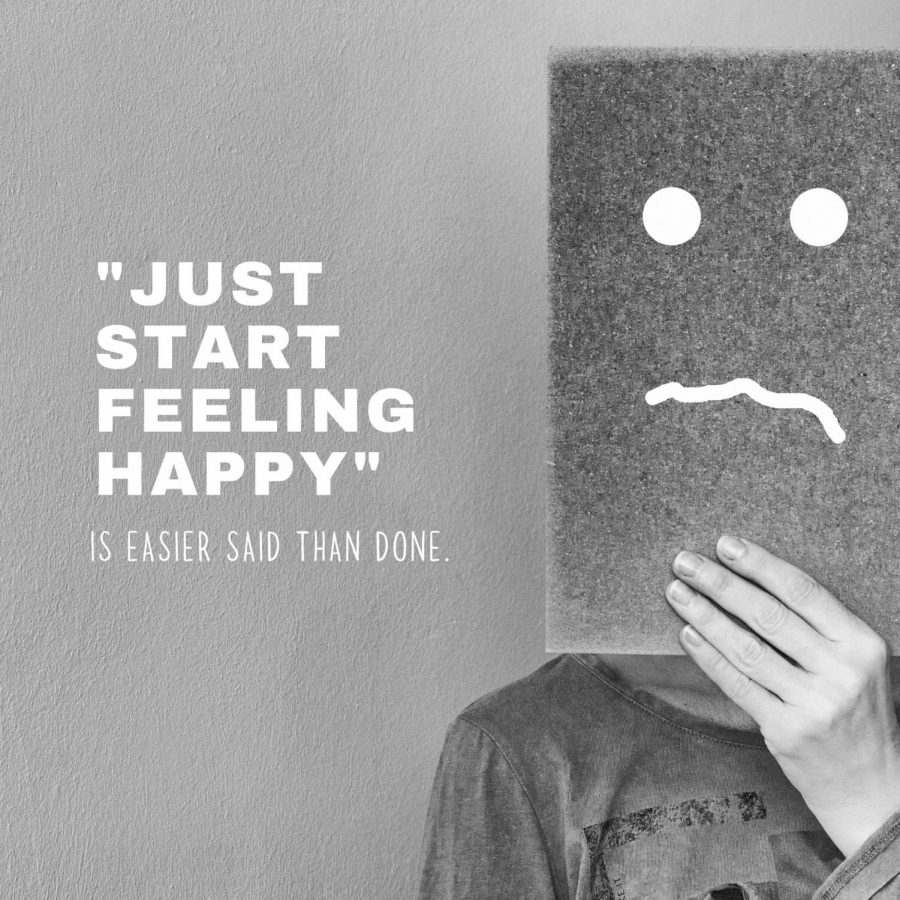Denying Depression
Staffer addresses his struggle with mental health
December 18, 2019
Depression is so weird culturally. The stigmas and stereotypes, distinctions between real and fake depression, the “just start feeling happy” attitude most have when it comes to treating it. It places the condition in a very odd position in our society. To someone without a proper diagnosis, it can seem confusing when it comes to understanding it. Should I seek help, or would I seem like an attention seeker? Such is the dilemma I’ve been facing for quite a while now.
I constantly had mental breakdowns in junior high, and I was unable to tell those trying to help what was wrong. I was so mentally clouded I couldn’t form words, but the tracking teacher demanded I told them right then and there. It only further caused me to hate who I was, being such a broken piece, I couldn’t even answer a simple question. But nonetheless, I always told my parents I had a good day at school. I couldn’t let them know either, they’d be on me about it all waking hours. Nobody could know. I needed nobody to think anything was up about me, whether it was autism or depression or any other problem I had. Just as magicians never reveal their secrets, I couldn’t reveal how broken I truly was.
Things would only get worse in my freshman year of high school. Not only had my parents hyped it up as the most difficult thing I’ll ever go through, whittling my self confidence to nothing like a pencil eraser was all used up, but I met my very best friend over Instagram, a fellow memelord from Florida who had the exact same sense of post-ironic humor as I, and by second semester, his own depression completely took him over, with our group chat needing to talk him out of suicide every other week. This guy was totally depressed. This guy wanted to kill himself every waking moment, while I only rarely toyed with the idea of suicide. I finally had it. I had something to compare my own condition too, a golden standard for what depression was. I could now confidently deny my mental issues.
And from there, I was the worst I had been. My meltdowns became more frequent, and I completely shut off every attempt to help me. I kept on saying I was fine because I thought my depression was fake. And this mindset was basically confirmed when my dad asked one simple question when I tried to help that friend get the help he needed:
“Is he just doing it for attention?”
The immediate rage I felt by that query was indescribable. It told me that doing anything about the problems I had was a bad idea. That was definitely not what he meant by that, but if he would call a raging suicidal a mere attention seeker, why wouldn’t he give that label to someone that cried every time he got a C on something because I was being pressured into making good grades by him and mom? It was set in stone in my mind from then: every time I was sad, it was a ruse. When I wasn’t feeling okay, when I wasn’t doing homework due to the weight of my emotions preventing me from lifting a finger, when I wanted a break from everything to calm down, I was faking it for attention, even though I actively wanted nobody to know I was depressed.
So as my friend was getting better, I was as low as I ever was, trudging through life knowing that while who I am and who I present myself as are completely different people, who I really was is a sham just for attention. Though my parents have given me Zoloft since then, I still endure a doublethink of being both sad and not sad at the same time, and it’s a hell I wouldn’t wish on my worst enemy. Please, don’t trap yourself in these lies like I have. You’re not alone; thinking so will make you more alone and detached from reality. There’s millions of things you can do to help yourself. Attend therapy, change up your diet, fix your sleep cycle, think in the present rather than dreading the future, makes goals for yourself to give your life meaning, these are just a few options that I’ve rejected in the past, but are very effective. I gave my friend that push he needed to feel better, and now I’m giving you one too. I’m trying to better myself, you should too.



